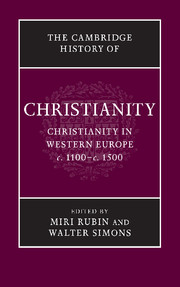Book contents
- Frontmatter
- Introduction
- PART I INSTITUTIONS AND CHANGE: 1100–1200
- 1 Clerical purity and the re-ordered world
- 2 The bishops of Rome, 1100–1300
- 3 Religious poverty and the search for perfection
- 4 Monastic and religious orders, c. 1100–c. 1350
- PART II FORGING A CHRISTIAN WORLD, 1200–1300
- PART III THE ERECTION OF BOUNDARIES
- PART IV SHAPES OF A CHRISTIAN WORLD
- PART V CHRISTIAN LIFE IN MOVEMENT
- PART VI THE CHALLENGES TO A CHRISTIAN SOCIETY
- PART VII REFORM AND RENEWAL
- Select bibliography
- Index
- Map 1 Western Europe c. 1100 – c. 1500
- Map 2 Universities of Europe
- References
1 - Clerical purity and the re-ordered world
from PART I - INSTITUTIONS AND CHANGE: 1100–1200
Published online by Cambridge University Press: 28 March 2010
- Frontmatter
- Introduction
- PART I INSTITUTIONS AND CHANGE: 1100–1200
- 1 Clerical purity and the re-ordered world
- 2 The bishops of Rome, 1100–1300
- 3 Religious poverty and the search for perfection
- 4 Monastic and religious orders, c. 1100–c. 1350
- PART II FORGING A CHRISTIAN WORLD, 1200–1300
- PART III THE ERECTION OF BOUNDARIES
- PART IV SHAPES OF A CHRISTIAN WORLD
- PART V CHRISTIAN LIFE IN MOVEMENT
- PART VI THE CHALLENGES TO A CHRISTIAN SOCIETY
- PART VII REFORM AND RENEWAL
- Select bibliography
- Index
- Map 1 Western Europe c. 1100 – c. 1500
- Map 2 Universities of Europe
- References
Summary
The Cistercian monk Caesarius of Heisterbach (c.1180–c.1250), scourge of the unchaste, tells the story of a ‘libidinous’ priest attempting to celebrate mass: at the moment of consecration a snow-white dove flies down to the altar and drinks up the whole contents of the chalice before flying away with the bread in its beak. This happens not just once but at the three consecutive masses the priest tries to celebrate. Terrified, and finally contrite, the priest confesses to his sin – he has had sex with a woman he happened to meet as he set off on his rounds at the start of the day. Once the priest is shriven, the dove returns the three hosts to the corporal and from its throat pours back all the wine into the chalice.
Caesarius combines his relish in telling stories that discomfit priests with a knowledge, even an acceptance of human frailty. For Caesarius celibacy is indeed of paramount importance for both clerks and monks; nonetheless, even those who fail to observe it can count on forgiveness provided they truly repent. Thus a monk who had left his house to become a secular priest and who had taken a concubine ‘as is the custom of many’ and had had children by her, was led to see the error of his ways; in a state of remorse he asked St Bernard (his former abbot) to re-admit him. Bernard agreed but, since he had a pressing journey to make, he told the priest he must wait awhile.
Keywords
- Type
- Chapter
- Information
- The Cambridge History of Christianity , pp. 9 - 21Publisher: Cambridge University PressPrint publication year: 2009

